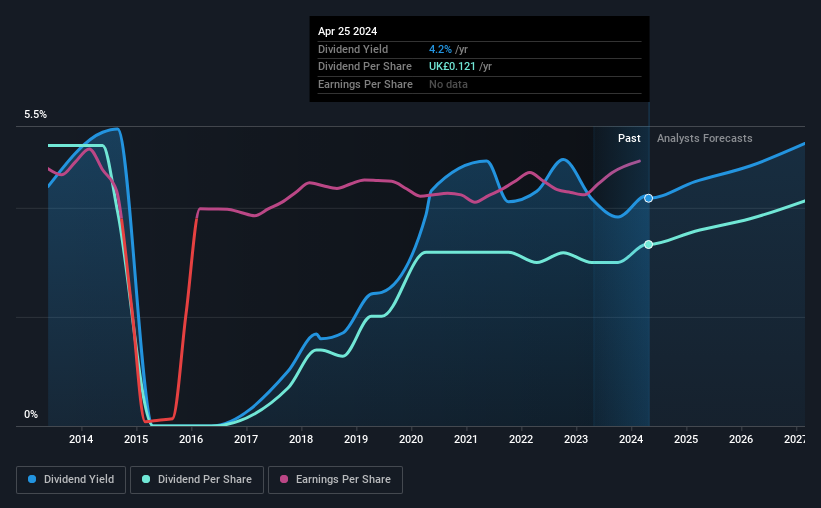Tesco (LON:TSCO) Is Paying Out A Larger Dividend Than Last Year
Tesco PLC (LON:TSCO) will increase its dividend from last year's comparable payment on the 28th of June to £0.0825. Based on this payment, the dividend yield for the company will be 4.2%, which is fairly typical for the industry.
View our latest analysis for Tesco
Tesco's Dividend Is Well Covered By Earnings
Unless the payments are sustainable, the dividend yield doesn't mean too much. The last dividend was quite easily covered by Tesco's earnings. This indicates that a lot of the earnings are being reinvested into the business, with the aim of fueling growth.
Over the next year, EPS is forecast to expand by 14.4%. If the dividend continues along recent trends, we estimate the payout ratio will be 42%, which is in the range that makes us comfortable with the sustainability of the dividend.
Dividend Volatility
The company has a long dividend track record, but it doesn't look great with cuts in the past. The annual payment during the last 10 years was £0.187 in 2014, and the most recent fiscal year payment was £0.121. The dividend has shrunk at around 4.3% a year during that period. Generally, we don't like to see a dividend that has been declining over time as this can degrade shareholders' returns and indicate that the company may be running into problems.
We Could See Tesco's Dividend Growing
With a relatively unstable dividend, it's even more important to evaluate if earnings per share is growing, which could point to a growing dividend in the future. Tesco has seen EPS rising for the last five years, at 8.7% per annum. Since earnings per share is growing at an acceptable rate, and the payout policy is balanced, we think the company is positioning itself well to grow earnings and dividends in the future.
Tesco Looks Like A Great Dividend Stock
Overall, we think this could be an attractive income stock, and it is only getting better by paying a higher dividend this year. Earnings are easily covering distributions, and the company is generating plenty of cash. Taking this all into consideration, this looks like it could be a good dividend opportunity.
Investors generally tend to favour companies with a consistent, stable dividend policy as opposed to those operating an irregular one. Meanwhile, despite the importance of dividend payments, they are not the only factors our readers should know when assessing a company. For instance, we've picked out 1 warning sign for Tesco that investors should take into consideration. If you are a dividend investor, you might also want to look at our curated list of high yield dividend stocks.
Have feedback on this article? Concerned about the content? Get in touch with us directly. Alternatively, email editorial-team (at) simplywallst.com.
This article by Simply Wall St is general in nature. We provide commentary based on historical data and analyst forecasts only using an unbiased methodology and our articles are not intended to be financial advice. It does not constitute a recommendation to buy or sell any stock, and does not take account of your objectives, or your financial situation. We aim to bring you long-term focused analysis driven by fundamental data. Note that our analysis may not factor in the latest price-sensitive company announcements or qualitative material. Simply Wall St has no position in any stocks mentioned.

 Yahoo Finance
Yahoo Finance 
